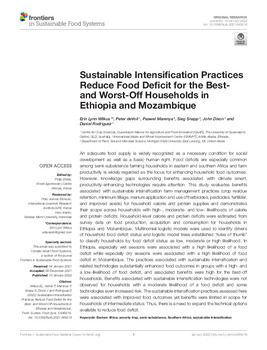Mostrar el registro sencillo del ítem
Sustainable intensification practices reduce food deficit for the best- and worst-off households in Ethiopia and Mozambique
| Creador: | Wilkus, E. |
| Creador: | DeVoil, P. |
| Creador: | Marenya, P.P. |
| Creador: | Snapp, S.S. |
| Creador: | Dixon, J. |
| Creador: | Rodriguez, D. |
| Año: | 2022 |
| URI: | https://hdl.handle.net/10883/21938 |
| Lenguaje: | English |
| Editor: | Frontiers |
| Copyright: | CIMMYT manages Intellectual Assets as International Public Goods. The user is free to download, print, store and share this work. In case you want to translate or create any other derivative work and share or distribute such translation/derivative work, please contact CIMMYT-Knowledge-Center@cgiar.org indicating the work you want to use and the kind of use you intend; CIMMYT will contact you with the suitable license for that purpose |
| Tipo: | Article |
| País de enfoque: | East Africa |
| País de enfoque: | Southern Africa |
| Lugar de publicación: | Switzerland |
| Volumen: | 5 |
| DOI: | 10.3389/fsufs.2021.649218 |
| Palabras Claves: | Semi-Subsistence |
| Descripción: | An adequate food supply is widely recognized as a necessary condition for social development as well as a basic human right. Food deficits are especially common among semi-subsistence farming households in eastern and southern Africa and farm productivity is widely regarded as the locus for enhancing household food outcomes. However, knowledge gaps surrounding benefits associated with climate smart, productivity-enhancing technologies require attention. This study evaluates benefits associated with sustainable intensification farm management practices (crop residue retention, minimum tillage, manure application and use of herbicides, pesticides, fertilizer, and improved seeds) for household calorie and protein supplies and demonstrates their scope across households with high-, moderate- and low- likelihoods of calorie and protein deficits. Household-level calorie and protein deficits were estimated from survey data on food production, acquisition and consumption for households in Ethiopia and Mozambique. Multinomial logistic models were used to identify drivers of household food deficit status and logistic model trees established “rules of thumb” to classify households by food deficit status as low, moderate or high likelihood. In Ethiopia, especially wet seasons were associated with a high likelihood of a food deficit while especially dry seasons were associated with a high likelihood of food deficit in Mozambique. The practices associated with sustainable intensification and related technologies substantially enhanced food outcomes in groups with a high- and a low-likelihood of food deficit, and associated benefits were high for the best-off households. Benefits associated with sustainable intensification technologies were not observed for households with a moderate likelihood of a food deficit and some technologies even increased risk. The sustainable intensification practices assessed here were associated with improved food outcomes yet benefits were limited in scope for households of intermediate status. Thus, there is a need to expand the technical options available to reduce food deficit. |
| Agrovoc: | POVERTY TRAPS |
| Agrovoc: | SUBSISTENCE |
| Agrovoc: | SUSTAINABLE INTENSIFICATION |
| Agrovoc: | SEMI-SUBSISTENCE FARMING |
| Datasets relacionados: | https://figshare.com/collections/Sustainable_Intensification_Practices_Reduce_Food_Deficit_for_the_Best-_and_Worst-Off_Households_in_Ethiopia_and_Mozambique/5784953 |
| ISSN: | 2571-581X |
| Revista: | Frontiers in Sustainable Food Systems |
| Número de artículo: | 649218 |
Ficheros en el ítem
Este ítem aparece en la(s) siguiente(s) colección(ones)
-
Socioeconomics
Including topics such as farming systems, markets, impact & targeting, innovations, and GIS

